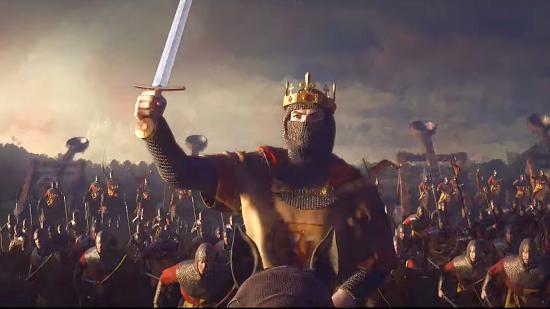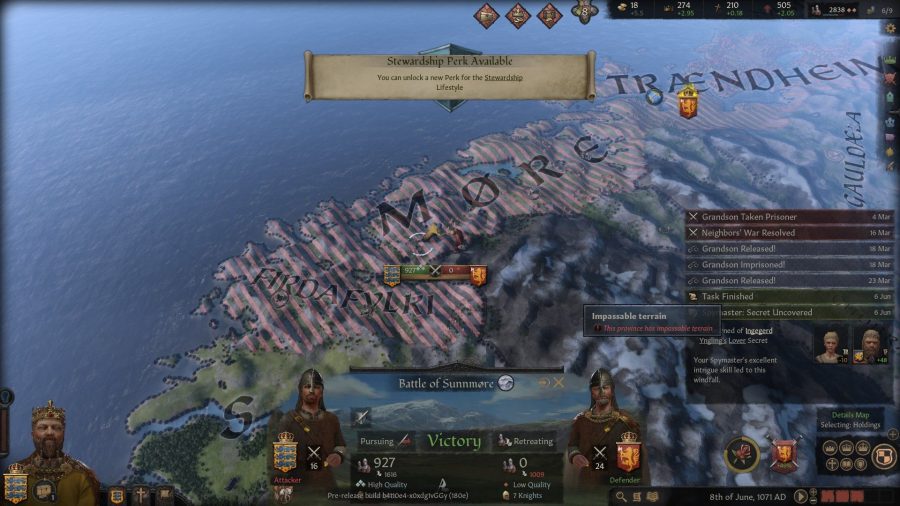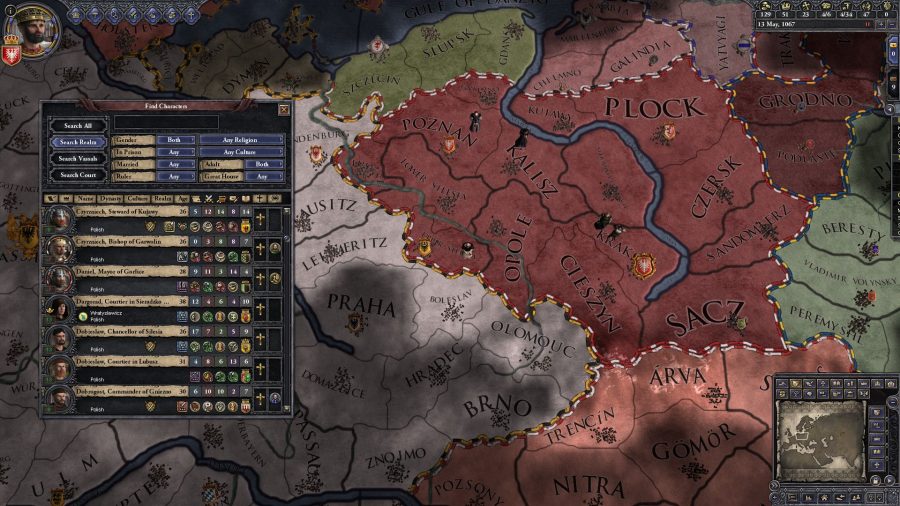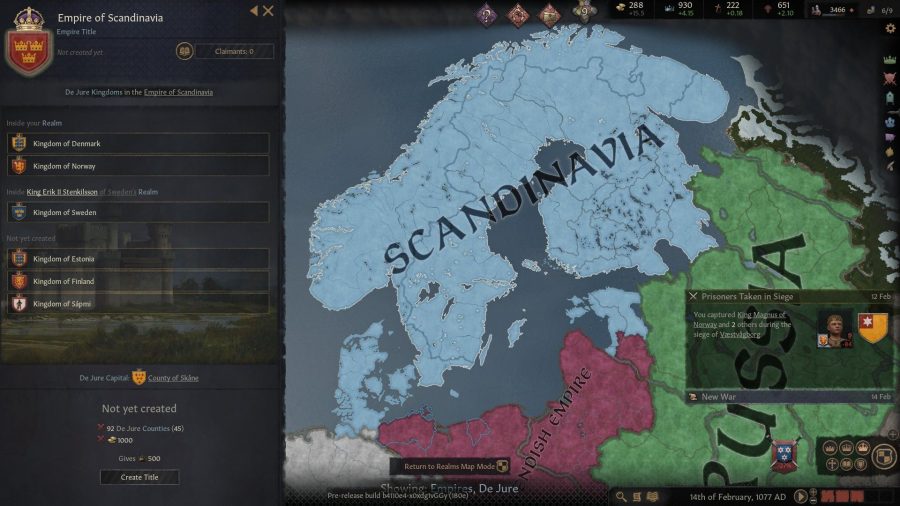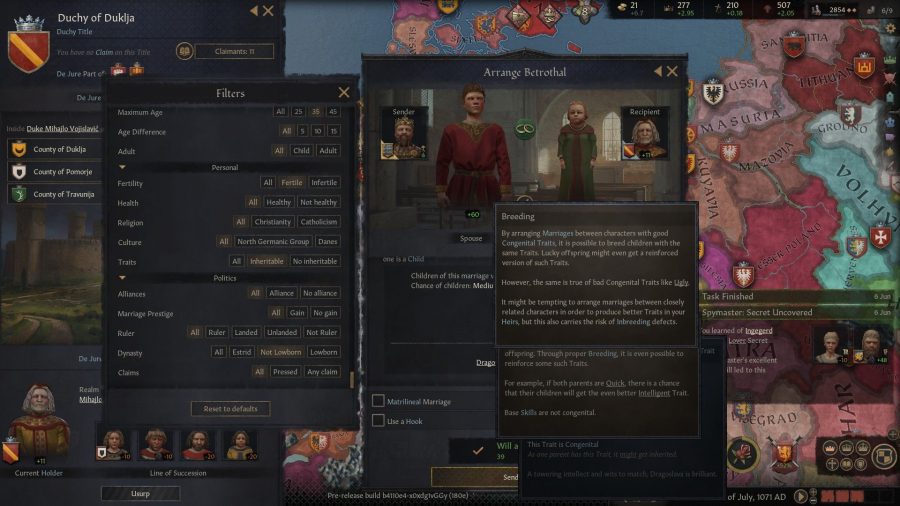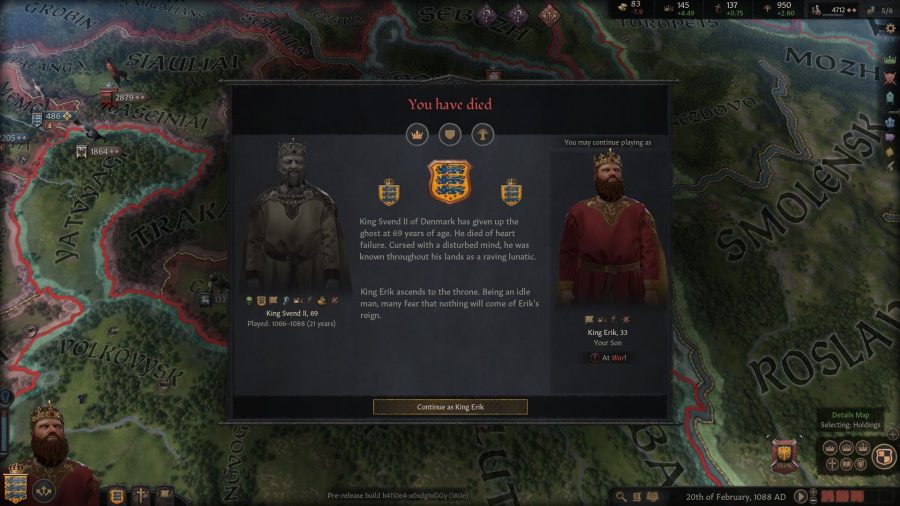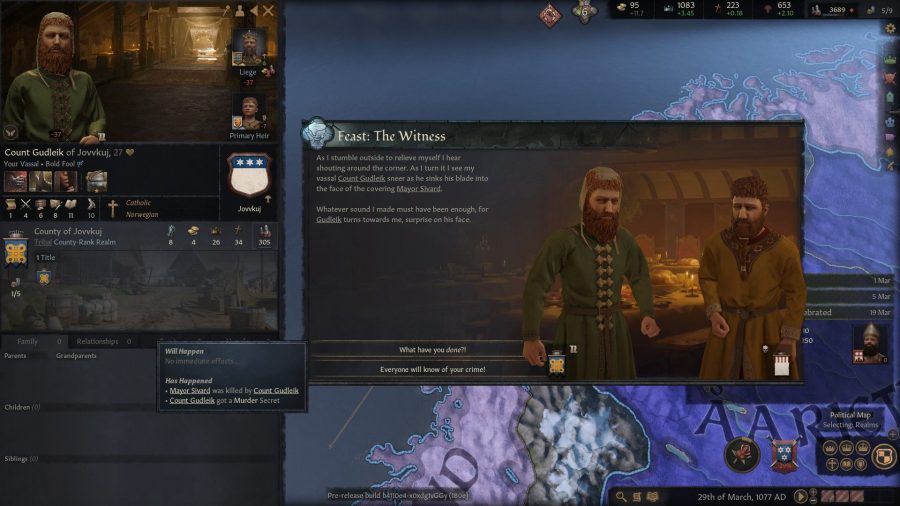August 31, 2020 This article was originally published in May 2020.
Our deputy editor Richard Scott-Jones and Joe Robinson, editor of our sister sites Wargamer and Strategy Gamer, both recently had a chance to play Crusader Kings III – and they brought different perspectives to the experience.
Rich never got along particularly well with Crusader Kings II – somewhat to his shame not only as our resident strategy nerd and supposed fan of needless complexity, but also as a lover of Medieval history. For his part, Joe would say it wasn’t his favourite Paradox game (he prefers Europa Universalis IV), but he stuck it out and has a pretty good sense of what it does well and badly.
If you, like Rich, are a big strategy fan who has nonetheless been wary of this most intricate series, here’s his Crusader Kings 3 gameplay preview. But we also thought it’d be nice to bring in Joe, as a more experienced CK player, and have the two reflect on their time in the game. Read on for a pleasant chat encompassing what CK3 changes for veterans, as well as where its particular appeal lies for newcomers.
Rich: Hey Joe! So, Crusader Kings III. Basically: I get it now. I’ve thought about it a lot since our preview access was switched off: how to get a claim on the next territory I want to take, how to placate new vassals to consolidate those conquests, how to keep them when my character dies. Granted, there are still some rules I don’t fully understand, but the difference with CK2 is I understand enough of them to keep me invested. The tutorial and nested tooltips helped with that.

Joe: It used to be a nerdy strategy gaming rite of passage to learn how to actually ‘play’ a Paradox strategy game. They’ve never explained themselves very well, but are full of minutiae and granularity that need to be learned. It’s fascinating looking at what Paradox has done with CK3 – very minimalist UI, and that tooltip-in-tooltip stuff is wonderful.
And yet, this is still a Paradox grand strategy game with plenty of obfuscatory quirks. One of the dangers of taking stuff off the main screen is that every menu you open needs to contain all the information you need to do The Thing, and sometimes that can be a lot of information. Also, there are some logic gaps that haven’t been covered yet.
For instance, I couldn’t figure out how to raise just my Men-at-Arms (Retinues, for any CK2 vets), and not the entire levy. I wasn’t even sure if it was possible, and the documentation couldn’t tell me either way. If you look at a particularly ‘involved’ or ‘mature’ character, there’s a lot going on in the character screen and sometimes it can be hard to parse everything you’re seeing. Things like the tech tree are also kept in counter-intuitive places. One step forward, two steps buried in a UI screen somewhere.
Rich: I found plenty of issues like that, but as I expected to spend most of the demo figuring things out I suppressed my frustration and assumed I was simply missing something. In most cases I was right about that, and was simply encountering a system the tutorial had missed but which I was happy to learn through experience. I was totally lost when a county’s borders started flashing purple at me – I’m now pretty sure this denotes an internal conflict of some kind, as the relevant duke was unhappy that I wasn’t his de jure liege and had started a faction against me and was also fighting a war against one of my own vassals. I had thought I should be able to stop him, but again, I think I understand why I couldn’t: my government type left vassals with a great deal of autonomy.
It’s a weird feeling to have an only partially confident grasp of the rules, but again, I found it much worse when I tried to get into CK2. It was very disempowering: I’m presented with all these systems, which offer overwhelming scope for action in theory, but in practice that scope was very often limited by lack of a particular currency, or by religion or government type.
That’s still the case in CK3, but I found it much reduced. I kept hold of conquered land by creating new duchy titles and giving them away to vassals within my family, which obviously this cost a lot of money, but I was able to find it in places I either missed or didn’t exist in CK2. Ransoming captives, using the Stewardship Lifestyle to raise my passive income and selling ‘hooks’ that I had on other characters, et cetera. What do you think – is this CK3 giving me more options, or have I just pushed past its cognitive pain point when I bounced off CK2 too soon?
Joe: Crusader Kings II is the game that put grand strategy on the map, but it’s also distinct among strategy games for one subtle but game-changing reason. Instead of the abstract personification of a nation, you are a person, with feelings, a family, and all that normal people stuff. There’s a reason CK2 has been compared to The Sims more than once.
The ‘metrics’ for progression are all a bit skewed compared to the rest of the genre – by design but also because of the setting. Technological progression wasn’t rapid in the Medieval era, so you won’t unlock shiny new toys very quickly. ‘Painting’ the map your colour, while satisfying, doesn’t accurately represent what was possible at the time, so the focus is about your character and how they live their life.
CK3 is definitely doubling down on the RPG elements, because it’s pretty much the only thing Paradox can throw content at without it upsetting the balance of the game. Don’t get me wrong, the map game is also vastly improved – although still confusing at times – but Crusader Kings more than any other grand strategy game is all about progress as a person over progress as a political entity. I don’t think either of us had enough time with it to really get a sense of ‘progression’ when you’re not conquering your neighbours or researching pointier swords.
Like you identified, CK3 is a massive toolbox, but it’s a toolbox that’s deliberately set up to only be used over a long period of time or under certain specific conditions. Resources like money are scarce, so any one character may only ever be able to build one ‘big’ thing perhaps in their lifetime. That’s why you have to look at the game over the course of an entire dynasty.
Rich: This is the mental shift I’m still struggling with. I’ve kept my save files from the preview, and I’m very much hoping to pursue the long-term goal of founding the empires of Scandinavia and Britannia when I get the full game (as I’ve pretty much decided I will). If goals like that aren’t realistic I don’t know that I’d be satisfied with 40 hours of ‘churn’ at the county or duchy level, clawing out small gains with one character only to see them undone on succession, or because a vastly superior empire got greedy, fabricated a claim, and slapped me around.
But then I suppose this is exactly what CK3 is addressing with the new dynasty trees. I didn’t unlock a dynasty perk even though I played long enough to have my starting character die (RIP Svend II of Denmark, conqueror of Norway, murderer of Harald Hardraade by snakebite), but it’s nice to know that there are some rewards for playing that persist beyond each character and can’t be taken away.
Joe: I managed to unlock one dynasty perk before my first character died, but then he was a badass. Pro tip: playing as Viking pagans makes conquering other people really, really easy; you get free casus bellis on all your neighbours. I was rolling in renown (the currency you need for dynasty upgrades).
Rich: I suppose ‘breeding’ – for want of a more edifying, less eugenics-y, term – is another long-term goal that’s hard for others to interfere with. Early in my playthrough, I looked for potential brides with the best inheritable traits and married one of them to my designated player heir, who I also picked for his personal qualities. No offspring yet, but again, I’m hopeful that by the end of the game I’ll be stepping into the shoes of a beautiful genius who will succeed in all things.
Joe: I didn’t spend a lot of time trying to get good marriages; it was always the part of CK2 I found a bit frustrating. You see these players who essentially speed-run the game by making the perfect marriage that lets them inherit the most stuff, but I’ve never really understood how you’re meant to play that mechanic. Generally, I just married someone with good stats, and if possible, someone who came with a decent ally. The signposting of the traits is definitely helpful in CK3, but if your spouse has good general stats I’ve found that can be more useful for a child than being ‘comely’, or whatever.
For me Crusader Kings III is a much better version of Crusader Kings II, but it’s still essentially Crusader Kings. I know some people are perhaps looking for this wonderful new experience, but I don’t think they’re going to get that. Things look decisively different, sure, and there are new mechanics – or old mechanics recreated in new ways – but you’re fundamentally playing the same game as you were before. The map game seems more satisfying, or at least easier to engage with.
I think what summed it up for me was when, towards the end of my session with the game, I remembered why I kind of disliked CK2 specifically in the first place. My starting character had died, his son had inherited the main title but only one or two pieces of land, so the majority of the kingdom was owned by vassals. At one point I was looking around the map and saw lots of vassal armies running around the place, fighting my neighbours, fighting each other, and then I noticed my kingdom somehow has land in the Netherlands and Germany. Much of Crusader Kings exists beneath your notice and beneath your control, like ants scurrying underground.
I’ve never felt comfortable having so little control in a strategy game, and no matter how pretty they make Crusader Kings or how many tooltips they write, I’m not sure Paradox will ever be able to make me feel totally at ease.
For more devious plots: See the best strategy games on PC
Rich: That’s exactly how I felt, so it’s reassuring you get the same vibe – suggests I’m not missing anything! It’s like I’m treading water in a stormy ocean rather than sailing a ship confidently through it.
This doesn’t bother me as much as I’d have thought, though. I was harsher than some critics on Civ VI’s Gathering Storm expansion because its natural disasters were setbacks that felt entirely arbitrary – a blizzard descends from nowhere to wipe out my tile improvements and halve a city’s population. What do I do? I either rebuild or I don’t. That’s not even a practical decision, let alone an ‘interesting’ one, to skewer Sid Meier’s most famous game series with his most famous line. It’s not problem-solving, it’s just putting out fires; a forced setback that can’t be factored into my strategy and thus offers nothing to a strategy game.
In CK3, all the information is there, buried deep in the map and the endless menus, to carve out some toehold in what can feel like an overwhelming monolith of skulduggery. You’d have to be some kind of savant to fully absorb and process all that information on your first try, but the fact it’s there – prominently so, in the case of major issues like titles you’ll lose on succession – helps alleviate that arbitrary feeling immensely, and it can all be factored into your strategy as CK3’s systems interrelate really well. Even when laws and resources kept me from pulling certain levers, this gives me something to work towards – ‘oh cool, I’ve won this war. Oh no, I’m going to lose most of these new lands when I die. Oh cool, I can consolidate them as a duchy and award the title to my heir. Oh no, I need more money to do that.’ And so on. I’d be less annoyed by Civ’s apocalyptic blizzards if I could anticipate them, mitigate their damage, or work towards a future technology that would steer them towards an enemy.
Play your way: Check out the best 4X games on PC
Ultimately, I suppose we’re saying that Crusader Kings requires strategy fans to make a couple of big adjustments: first, accept that you’re not going to conquer the world, and that you can’t control everything that’s going to happen to you – in fact, it may take a while before you even understand it. Things will happen, like succession or assassination, that will force you to take a step back. ‘Progress’ or ‘success’ is about taking two steps forward for every time that happens, and about playing the hand you’re dealt well.
Joe: Exactly – Crusader Kings is about making the best out of chaos, and ultimately learning to ‘let go’ and let the game happen around you. Crusader Kings III I think represents the best version of this idea to date and I’m looking forward to getting my hands on it again, despite how uncomfortable it makes me at times.
Crusader Kings III is out on September 1. The Steam page is live now.
